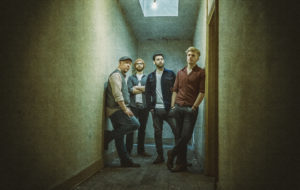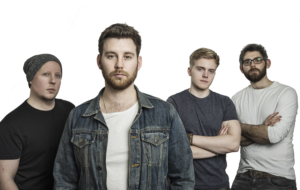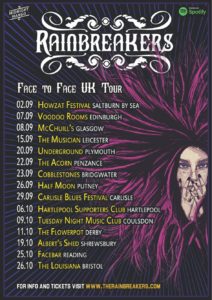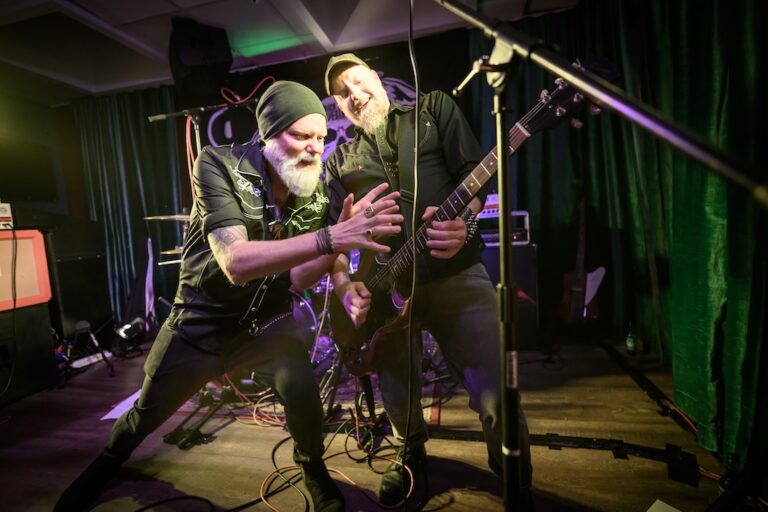
Just to get a bit of background, you started the band pretty much at school with Pete, is that right?
Yeah, when I was fourteen or fifteen, me and Pete, the bass player, were messing around learning to play our instruments and my brother, Sam, who’s on drums, we were sort of learning – playing in our garage back at home and we normally had the door open because it was in the summer or whatever and people would stop by and have a listen and we started doing some shows in the local parks and stuff when we were fifteen / sixteen and eventually I learned to drive and we started doing it further afield – anywhere around Shropshire, where we live. And that’s how it all started, really. We thought it was great, we like playing and we were only playing covers and stuff, but we did try and write songs, even at that point. We just wanted to write songs, really, Then, they went off to University and when they came back, I asked them if they wanted to pick up where we left off and that’s kind of how it started.
I guess a lot of people have something like that when they’re younger, but was there a point where you realised that the band was becoming more of a serious endeavour?
I don’t remember a specific point where it felt like it had changed, but I think, probably, a couple of years ago, we got our first support slot – the first real opportunity we had – where people had plaid money to see a band play, rather than being in the corner of a pub, we were actually on a stage with professional PA and lighting and stuff. It was just a different vibe and it grew from that. We got other supports and other festival appearances which led to more supports and more festival appearances, etc. etc. I think it just became… the more we did those sorts of shows where people were paying to see music, I guess, and to see live bands, we felt we enjoyed that more because people were really there to listen to what you were doing as opposed to being in the corner of a pub, if that makes sense. Not that it’s a bad thing to play in the corner of a pub, it’s just that people aren’t necessarily there to listen to you. They’re there for a night out and they might just have been there by chance anyway. But, playing to an audience who want to listen to original music, there’s something quite satisfying about that, you know. It’s nice to do that and we feel very privileged to be able to do that as well.
At some point within that, you did the two EPs as well – Rise Up and Blood not brass…
Yeah, that’s right. Blood not brass was our first one, which was a few years ago now. It was our first real… we had recorded something beforehand, but just very haphazardly, really. But this was our first effort where we said “this is what we sound like now, this is what we’d like to sound like…” that was our first real attempt at that with blood not brass, and I think it was our first attempt to try to branch out further by trying to get it played on radio and seeing if anyone in magazines might want to review it – stuff like that – and it was received pretty well; people seemed to like it, people seemed to attach themselves to the songs as well, which was cool, and that gave us the opportunity to think that we should maybe do it again, and that’s when we did Rise Up. We’ve always done our own thing a little bit, kept ourselves to one side and just done whatever it is we feel like we want to do. We did the EPs, I guess, to experiment with our own sound and writing abilities and, because of that, we’ve got to a point now where we’re releasing an album, but I feel like we were ready to do that. We’ve learned a lot, we’ve learned from our mistakes, what we like and don’t like from recording and writing. We thought we could take that step, because it’s quite a big step up to do an album, your own material and all that, it makes a big difference. Yeah, it’s been an interesting process.
I think there’s a very big learning process that any band goes through, where they go into the studio for the first time and everything is new and exciting and you kind of need guiding through that. But, I guess both EPs were very much self-released and doing in-house?
Yeah, and we still are doing it that way. We have a booking agent, which makes a big difference and it makes life easier, but fundamentally we’re doing everything ourselves, whether it’s running our website, our social media, the PR for what we do… all of it’s… we might employ people to do certain things, but we’re in control of it all. I personally quite like it. It works for us, it allows us to be be who we want to be. If someone wants to come and get involved in that, i.e. if record labels are interested… it’s not something we’re against, we’d have conversations, but they’d have to be able to do more than we can do. We don’t want to lose our creative control and we like to build an honest following really.
Looking at the debut album, face to face, you got to work with Tom Gittens on this, who has one hell of a CV – how did you get involved with him?
Well, I had a few producers sort of lined up, that I wanted to talk to and engage with and see what they could do. I listen to what they do… it’s difficult, because when I listen to the bands that these producers have recorded, I’m listening to what I think production-wise they’ve actually added to the song, which is difficult to completely know because I don’t know what conversations were had with the bands they recorded, if that makes sense. But, I listen to some stuff that producers recorded and I narrowed it down to a short list and Tom Gittens was on that. Then it’s based on, I think, how you get on with the person. I rang Tom and I rang a few other guys and I got on with Tom, on the phone, really well. I can’t define it, we just seemed to connect and understand each other and that carried through to when we went to the studio and actually ended up starting the recording process because there was lots of communication beforehand about artists we liked, artists we were trying to gently emulate and that we respect. And what we were trying to achieve sonically as well as the messages we were trying to put out, and he was totally on board with who we were trying to be and he didn’t want to do anything other than do what we were trying to achieve, really, which was really satisfying.
One of the great advantages of recording as a band now, is that you have that opportunity to do demos prior to going into the studio. Did you present him with material that you wanted to do and was that done on acoustic, or via computer…
Yeah, so we recorded just using our iPhones and stuff in our rehearsal studio and all the songs we wanted to record, we had all the lyrics written down, we’d written down what the songs were about and what they meant to us and what the messages were within them. We wanted to give him the best idea of what we had in our minds that we could. References to what bands we… what had caused us to come up with that riff or what we were thinking sonically…And then we spent a whole day just discussing it all. Just talking about it and making notes on all the different songs and doing a bit of a self-edit and we were doing all that for a while and that allowed us to, I think, really get into the songs and pull out the best of them. Once he understood them as much as we… well, maybe not as much as we do… but more than just “here’s a song – press record!” He was involved totally with what we were trying to do, so he was able to pull the songs out, or push them back, and that really adds to the recording and to the song.

It’s a really important discussion to have – so, once you had the songs together, it’s also important to think about sequencing the songs – was it a challenge to get the album together in that way and did Tom help you with that?
Yeah, that was actually harder than we had thought. I don’t think we’d really given that enough thought beforehand. We were so focused on the actual songs and making sure that they were correct and that the parts were right and that we knew everything we were going to play. So, we knew how the recording process was going to go and then, all of a sudden, when were in the studio, we had this Epiphone that these songs need to go in an order. So, we looked at a few different options and we started by writing the songs down and what they meant and if there was a kind of storyline that we could follow. There was a message throughout the album, and it’s definitely about some things that have gone on in my life and Sam’s life and the experiences we’ve had, so there is sort of a theme running through it. So, we tried to kind of bring that story and we used the song-titles to try and build sentences, if that makes sense, to flow the story through the album, and that seemed to work for us. But, I think, in the future, I would definitely like to spend more time looking at how you could link songs and make them flow together and bits and pieces like that because there are a few albums I’ve listened to that have done that. For example the Delta Saints from America, there’s a song where they did that and they flow into one another and it works really well. It’s a really good idea, I like that and I think you could do that in an album. So, there are definitely things we can improve and change in the future.
It’s definitely an art and, like you, I love it when bands segue songs into one another, and it works live too.
Yeah, and again, when you’re playing the live songs, they take on a different character as well, because there’s an edge and a rawness to performing live and that’s something we wanted to do. When you perform live, it’s one way of hearing our music and the second way is to hear it in a slightly wider format, if you like, and elaborated ideas on the album where you get to hear different things that, perhaps… not that we can’t do them live, but we don’t have the extra pair of hands to do it live. In the future, we’d like to have a few extra members in the band, maybe, and have someone on keys and maybe even some backing vocalists. There are all sorts of different things, but right now, I think it’s nice to give people the two products. They can hear the song like this, where it’s all singing and dancing (no pun intended) or they can hear the raw, energetic one that happens when we perform live.
When you get those two sides of the same coin – on record you have the opportunity to be more ambitious and to put in those extra elements that, perhaps, don’t make the song but give it that extra atmosphere and then live you get a much more visceral experience and I think that’s definitely better than just playing the same thing note-for-note…
Exactly! And it’s a little bonus isn’t it because you’ve heard the record, but you haven’t heard the songs live… And that’s what happens with the bands we like. It’s a good experience and it’s nice to be able to do that ourselves.
You mentioned this idea of a theme in the record and, from what I understand, one of the themes that seems to be embedded in the record is a discussion about depression and the importance of openness and discussion, which is obvious a big social theme at the moment…
Yeah – definitely. The band… the position I was in when everyone came back from university and we decided to restart the band, I was at a really low point in my life personally – I was struggling and I had been diagnosed with depression and anxiety and stress-related things due to a job that I’d had, as well as personal situations with relationships and, I was sort of… I didn’t want to do anything. I didn’t have any interests, I didn’t feel interested in anything, I was really low and the doctors and the therapists told me to try to pick up things that I used to enjoy and music was always something that I always wanted to be a part of and something that I liked. I can’t tell you why… maybe it’s my DNA somewhere that I like doing it, so, the catalyst to starting the band was this low point in my life and I think the songs that we’ve written have been about that time, sort of reflecting back on it and how important it was for me that I got to focus my attention, my time and my mind on something positive and that the best way… it’s always been therapeutic for me… very therapeutic to get this album out and to write these songs, because I feel like I can… not park that part of my life, but kind of that I’ve come through the other side of it now. I’ll always have some of those tendencies within myself, but this album… it consolidates it all into one point for me, and I feel like I can come out the other side and head into the next stage of my life, if you like. If I can… I think it’s important that if someone, if anybody says… anyone of us can get up and say to the next person “I’m here for you, It’s OK, It’s OK to tell me if you don’t feel right.” Being gently in the public eye and performing on stage, I don’t think people would ever perceive to have those kind of tendencies. They perceive you to be quite outgoing and confident and secure in yourself and I thought that maybe, being in that position, there was a bit of a responsibility to say: “look, I’ve had that, but I don’t let it pull me down, I’ve come out the other side and it’s important to talk about it…” And the album became my therapy, really.
It’s an important topic, not least because of some of the people that the music community has lost over the last few years, but it’s also, I think, very challenging for an artist to draw that line between what is cathartic and also make it relatable for a wider audience.
There’s always a process where you edit, then you self-edit, then you re-edit… so there’s a continual process, but ultimately, when you come to write lyrics really, what happens (for us, anyway) is that we’ll have a riff, or an idea for a song and then I’ll kind of ad lib over the top for a bit. So, I find something that feels right and that’s comfortable for me to sing and that I want to sing. And then there might be the odd lyric or word that I half say, or it sounds like I’ve sad, and that becomes part of the lyrics and then we build from that. It may be not until we’re a third or half way through that I start to realise what the song is about, and that’s when I can finish it. It feels like it comes from a sub-conscious, rather than a conscious place and then I can start to write the song and think about what I’m trying to say. I definitely… I never want the songs to be too… if you write a song that’s too personal, it can’t be relatable, like you say. It can’t reach a wider audience because they can’t connect to it themselves. They have to understand, and I think… I’m pleased that we’ve managed to do that and I think it’s lucky as well as that we’ve tried, if that makes sense.
Obviously you’re heading out on the road, including a show in Leicester…
Yeah – the 15th September at the Musician…
So, you’re obviously building momentum – how do you see the rest of the year going?
Well, we’re going to tour the UK through Sept / Oct. We’re then going to Spain for a couple of weeks to tour there again and we’re really looking forward to going back there. It was amazing to be able to go in the first place, but to be able to return is extra special. We’re really looking forward to going. Then I think, after that we’re probably going to have a bit of a break for a minute – it’s been a really busy year for us. We started the process of recording this album in the August of last year and we’ve been touring, recording, writing, moving our studio, trying to get in new countries like France and Holland… it’s been a really busy year and we’re excited about that, but I think we’re looking forward to just being at home in December so we can just reboot ourselves and our energy for next year when we can go out again, start off and push the second leg of the tour for the album. And then it’ll be time to start writing again, to record again, because we just like to write songs.
Any final words for your fans?
Only that without them we wouldn’t be doing what we’re doing. So, we appreciate them to the core of their being. They allow us to do something that we love to do and that is, for me personally, it allows me to… it’s therapy for me and I really appreciate that. It’s amazing that we’ve managed to get people to connect to our music. I can’t really describe how amazing that feels. I never thought, as a teenage boy learning guitar and trying to write songs, that one day, people would actually want to listen to, and buy my music, and come to the shows. All of us respect and thank anyone who’s into our music, wholeheartedly, because we really appreciate it.




